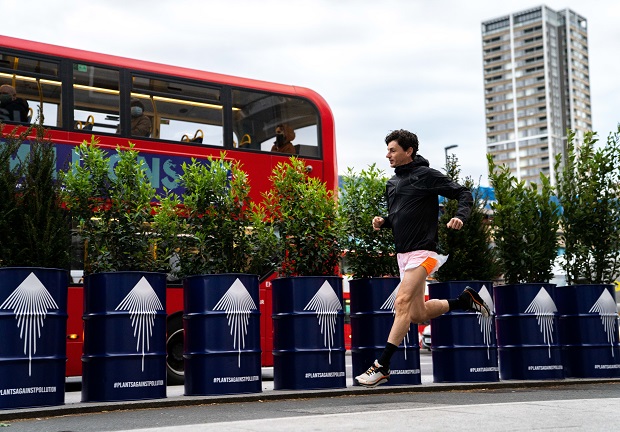- Lockdown led to cleaner air and an increase in outdoor exercise
- As restrictions ease concerns about air quality have resurged
- TENZING is building natural barriers using trees in London’s pollution and exercise hotspots in Plants Against Pollution campaign
- Hotspots were identified using the TENZING Clean Air Tracker which was launched with Imperial College* in 2019, helping Londoners find clean air in the big smoke

 Air pollution is one of the greatest hazards to human health and is responsible for one in every nine deaths each year[1]. As lockdown eases and more cars return to the roads TENZING is continuing its fight for cleaner air with the launch of its Plants Against Pollution campaign, by building natural tree barriers in activity and pollution hotspots.
Air pollution is one of the greatest hazards to human health and is responsible for one in every nine deaths each year[1]. As lockdown eases and more cars return to the roads TENZING is continuing its fight for cleaner air with the launch of its Plants Against Pollution campaign, by building natural tree barriers in activity and pollution hotspots.
Since the launch of the TENZING Clean Air Tracker in 2019, nearly half a million activities have been recorded, providing a huge number of data points enabling the company to identify where most people exercise and where the most polluted areas are. Based on this data the areas needing most urgent intervention became apparent.
The TENZING Clean Air Tracker[2], which makes polluted air visible for Londoners, syncs with GPS fitness tracker STRAVA and uses real-time Air Quality data, from Imperial College London, to give users a live Air Quality Score on their walking, running and cycling routes.
“Combining our pollution data with Tenzing’s running data has opened up a new view of where and when runners are most exposed in the capital. A network of green running routes across the city would mean runners get more of the benefits of exercise and less of the pollution which is the best of both worlds.” said Andrew Grieve Senior Air Quality Analyst from Imperial College London.
The TENZING Clean Air Tracker ranks London air quality on a scale of 0 (bad) to 100 (good) and allows users to plan cleaner routes. Pre lockdown average scores of 62 (February 2020) rose to 83 in February 2021 during lockdown and April 2021 data shows scores slipping back to 71. The app also recorded that walks, runs and cycling activities increased by more than 15% within the first two weeks of each of London’s three lockdowns.
Working closely with Imperial College, TENZING’ Plants Against Pollution campaign will build natural barriers using specially selected trees and shrubs to protect those exercising outdoors from air pollution, which increases the risk of respiratory problems. Evergreen species such as laurel will be planted as they have been shown to be the most effective at trapping pollutants.
“We know plants nourish us on the inside, and now we’re using them to protect us from outside hazards too” said Huib van Bockel, the founder of TENZING, “Our TENZING Clean Air Tracker has allowed us to map where people exercise and where the most polluted areas are. Add those together, and we’ve identified critical spots across the capital that need urgent intervention.”
Using data from the Clean Air Tracker the most polluted and most popular exercise routes in London have been selected. The first location for the natural barriers is Elephant and Castle roundabout, SE1. The company plans to build on this urban intervention and work with London councils to roll the campaign out city-wide after the initial trial.
[1] World Health Organisation. Ambient Air Pollution: A Global Assessment of Exposure and Burden of Disease (World Health Organisation, 2016).
[2]* The ‘TENZING Clean Air Tracker‘ syncs with GPS fitness tracking app STRAVA and uses real-time Air Quality data, provided by King’s College London’s Environmental Research Group (since transferred to Imperial College London), to give users a live Air Quality Score for their route.
An Air Quality Score automatically appears on the user’s STRAVA profile after every cycling, running or walking activity. This knowledge enables them to edit future routes; potentially cutting life threatening pollution exposure by up to 50%. By choosing less polluted routes, which are also likely to have fewer vehicles, cyclists are not just protecting themselves from pollution but increasing their level of safety from road accidents.
In addition to monitoring the live air quality, the tracker also suggests alternative clean-air cycle, running and walking routes for popular commuter journeys in London.





Comments are closed.